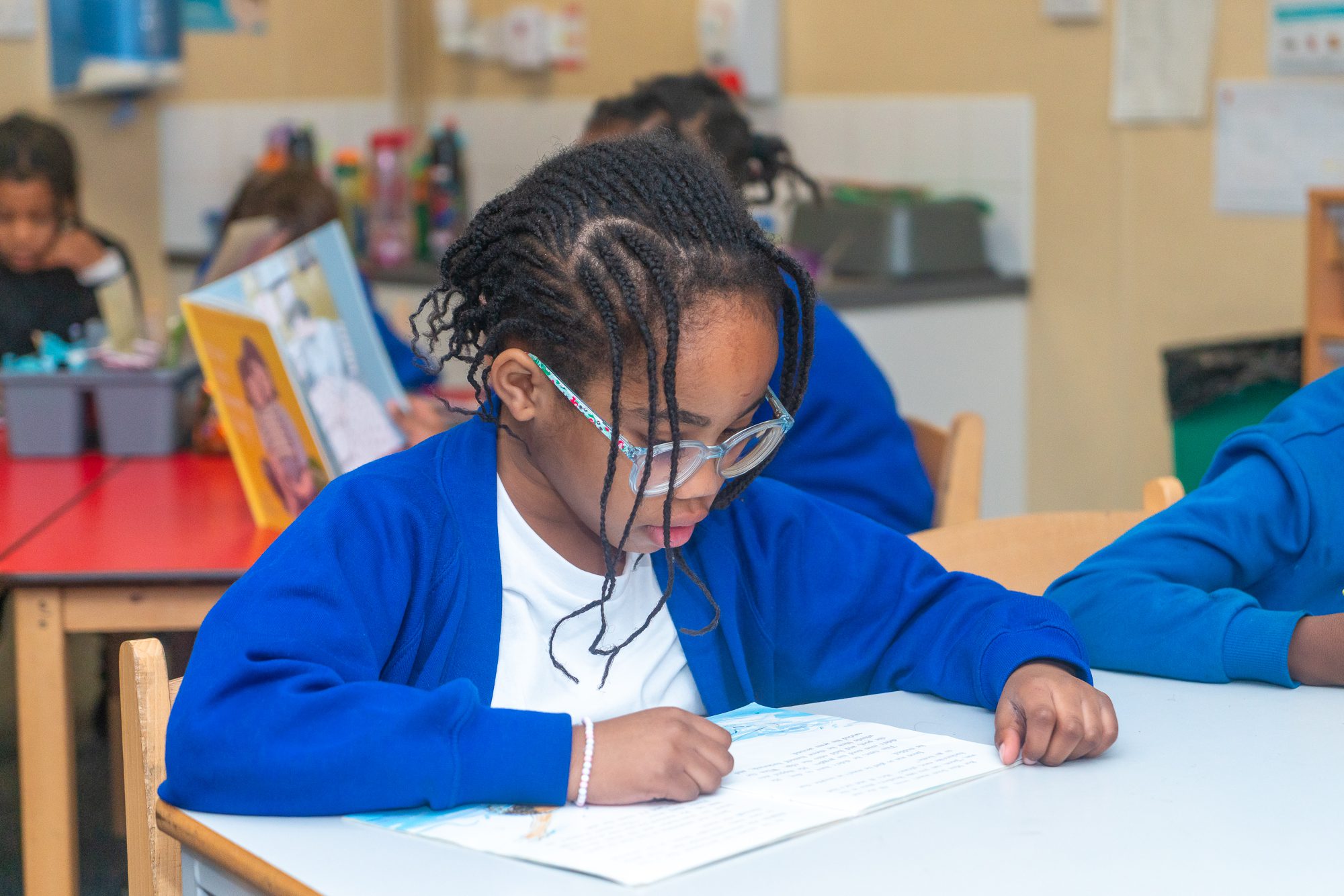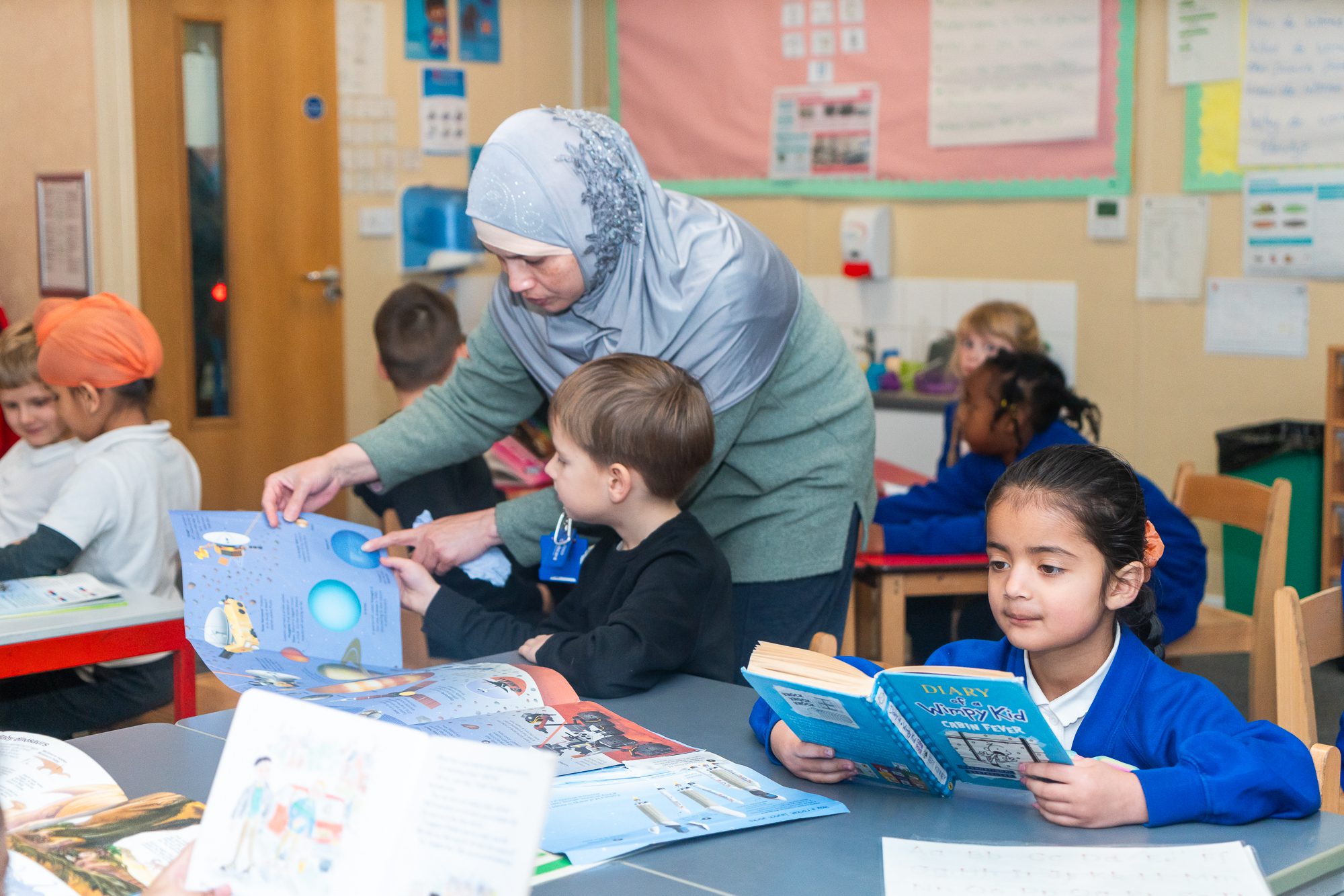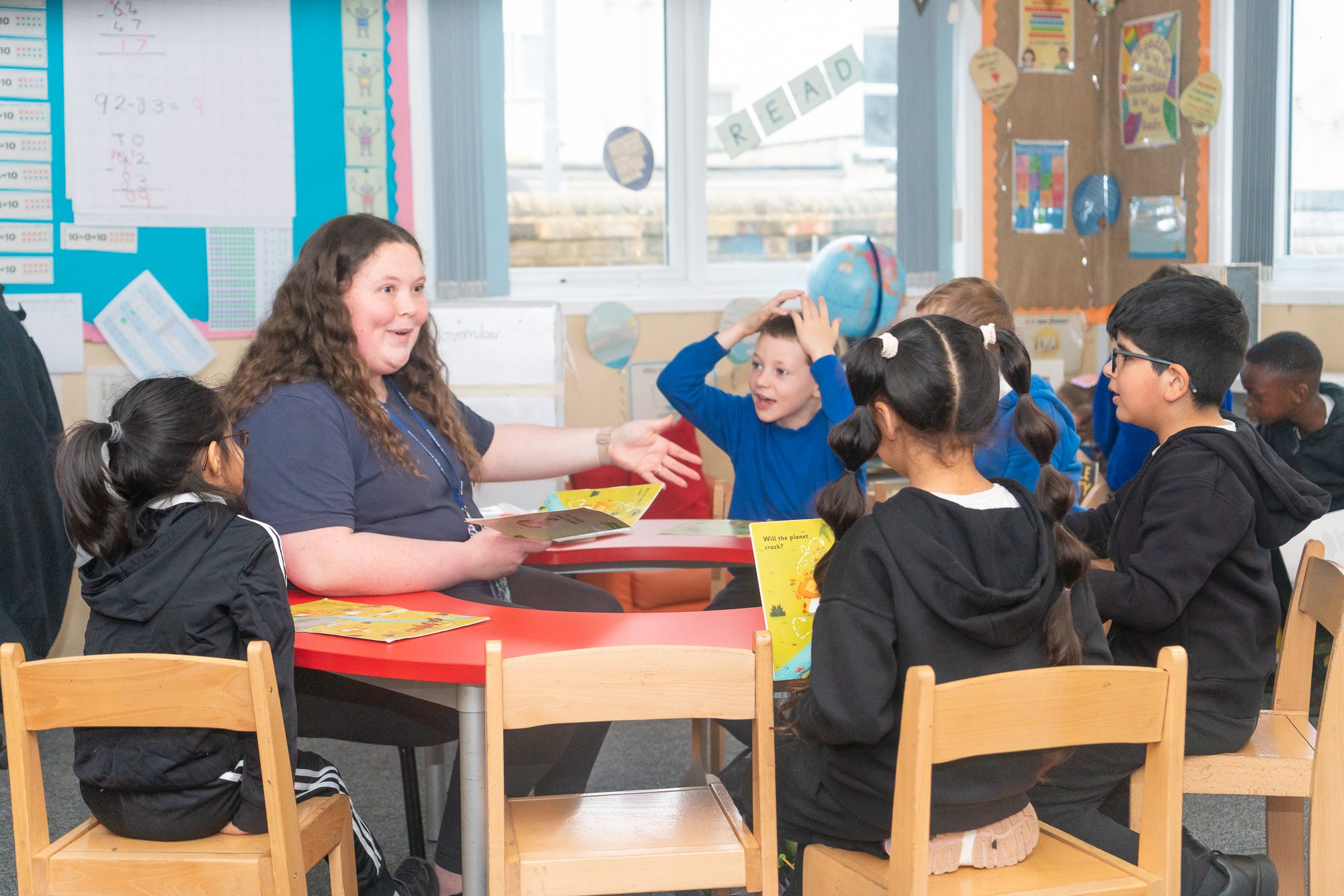English Reading Subject Leader: Miss L Edwards
English gives pupils the building blocks for successful communication and a life-long love of learning.
Hearing a story read by an adult is a daily pleasure for our pupils: a time to listen to a fluent reader reading with expression and enthusiasm gives pupils a joy for reading themselves. Predicting ‘what happens next’ develops comprehension skills, and again, those vital communication skills.From making marks on a page to writing a complete text, with paragraphs and a wide variety of punctuation and vocabulary, we experience writing every day, across a range of curriculum subjects. Our development of spoken communication gives pupils the tools to transfer their ideas into writing: from stories to poems to instructions to letters, and many more.
For any more information on Holy Trinity’s English Reading Curriculum, please contact the office
Intent
Our English curriculum is designed to develop confident, independent, and successful readers. Our pupils receive a stimulating and enriching experience in English, developing the skills necessary to master the National Curriculum English Programme of Study.
We believe that developing a love for reading is the first step in a child’s reading journey. Throughout our provision we expose children to books and storytelling, thus encouraging them to interact with texts and begin to form opinions and questions. This develops as the children progress through the school, with the use of high-quality texts, across a range of genres. Children are taught in a ‘language-rich environment’ where word acquisition is encouraged and promoted. All pupils receive daily explicit instruction on spelling in a variety of ways that actively involve pupils.
Our aim is for children to leave school able to read a wide variety of texts with enjoyment and comprehension.
Our curriculum is relevant, engaging and memorable. It will create lifelong learners.


Implementation
We follow a clear, sequential curriculum based on the National Curriculum which builds skills in reading progressively throughout the school. Children receive direct teaching in reading skills as well as a wide range of opportunities to develop and hone these. We create a “language-rich” learning environment where reading and books have a high priority and status. We believe that no child should be left behind or become a disenchanted reader so targeted interventions – both group and individual – are deployed appropriately.
Our English content is centred around The Power of Reading. This has been developed by the Centre for Literacy in Primary Education (CLPE) which carries out highly regarded classroom-based research and has extensive experience of working with teachers. Their Power of Reading project combines the use of outstanding books for teachers and children with an approach to teaching the English curriculum that is creative, engaging and develops a love of literacy.
Pupils use a high-quality text each term that explores a range of genres through reading. Our pupils focus on high-quality vocabulary within their text; infer character traits through ‘role on the wall’ activities; predict what will happen next, explain why something happens by referring to the text; retrieve facts from the text and sequence or summarise events in the text. This enables the development of comprehension skills.
For more information and resources for Phonics, visit our Phonics page.
Impact
By the time children leave in Year 6, they are competent readers who can recommend books to their peers, have a thirst for reading a range of genres, including poetry, and participate in discussions about books, including evaluating an author’s use of language and the impact this can have on the reader. They can also read books to enhance their knowledge and understanding of all subjects on the curriculum, their community and the diverse world we live in.
We strive for every pupil to leave us with the necessary skills to access the reading and vocabulary demands of the secondary curriculum and for them to be successful communicators throughout their lives, making them ready for the wider world of secondary school, further training and employment.

Accelerated Reader
At Holy Trinity C of E Primary School, the children from Year Two upwards follow Accelerated Reader. Class teachers will decide when it is appropriate for the children to start using Accelerated Reader. A child needs to have some fluency in their reading as this programme does not help children learn to read – it consolidates their learning and promotes reading comprehension rather than decoding and word reading skills.
Accelerated Reader is a computer program that helps teachers manage and monitor children’s independent reading practice. Children, with the support of their class teacher, pick a book at their own level and read it at their own pace. When finished, the children take a short quiz on the computer or iPad. (Passing the quiz is an indication that the child understood what was read).
If a child does not do well on the quiz, the teacher may help them choose another book that is more appropriate or ask more probing questions as they read, and before they take their next quiz. In most cases, children really enjoy taking the quizzes. Since they’re reading books at their reading and interest levels, they are likely to be successful. This is satisfying for most children. Best of all, they learn and grow at their own pace.

English Reading in Each Stage
Reading is taught using the Little Wandle Revised Letters and Sounds phonics scheme. It focuses on both word reading, through the teaching of systematic phonics, comprehension through a range of reading skills, including retrieval, inference, and vocabulary, and prosody, which includes intonation and expression when reading aloud.
Children who are at the expected level at the end of Year R are able to say a sound for each letter in the alphabet and at least 10 digraphs. Be able to read words consistent with their phonic knowledge by sound-blending. Be able to read aloud simple sentences and books that are consistent with their phonic knowledge, including some common exception words. They will also be able to demonstrate understanding of what has been read to them by retelling stories and narratives using their own words and recently introduced vocabulary; anticipate – where appropriate – key events in stories; and use and understand recently introduced vocabulary during discussions about stories, non-fiction, rhymes and poems and during role-play.
Recommended Books for Reception
For more recommended reading, please visit the EYFS Class page.
To read our Phonics and Early Reading Policy, please visit the policy page.
Reading continues to be taught using the Little Wandle Revised Letters and Sounds phonics scheme. It focuses on both word reading, through the teaching of systematic phonics, comprehension through a range of reading skills, including retrieval, inference and vocabulary, and prosody, which includes intonation and expression when reading aloud.
Pupils will use the CLPE Power of Reading sequences of learning and access high-quality texts.
They will be able to join in with simple rhymes and phrases from traditional tales. They will be able to retell the beginning, middle and end of stories and find information in simple non-fiction texts. They will be able to make comments about what they have read and answer questions such as ‘What do you think might happen next?” Pupils will use their knowledge of phonics to segment and blend words and read books to build up their fluency, confidence, understanding and enjoyment. They will read words containing the suffixes -s, -es, -ing, -ed, -er and -est and begin to understand the use of the apostrophe for the omission.
Pupils will talk about books that are read aloud to them and discuss their thoughts about the events and what may happen next. They will begin to recognise the features of non-fiction books (e.g. illustrations, headings, contents and index) and use these to find information. They will retell stories using familiar story structures and language, such as ‘Once upon a time’ and learn simple poems by heart. With adult support, they will begin to use dictionaries and thesauruses to find the meanings of new words. Pupils will use their growing phonic knowledge to read familiar and unfamiliar words and words containing the suffixes -ing, -ed and -ful. They will be involved in choosing their own reading books and building up their fluency, confidence, understanding and enjoyment.
Pupils will use the CLPE Power of Reading sequences of learning and access high quality texts.
They will listen to and discuss a wide range of fiction (including poetry and plays) and non-fiction texts. They will be able to retell fairy stories and myths and legends and talk about a character’s thoughts, actions, and feelings. Pupils will be able to identify adjectives and adverbs and use dictionaries and thesauruses to find the meanings of new words. Pupils will begin to self-correct reading errors using their knowledge of phonics and spelling patterns. They will begin to recognise different forms of poetry (e.g. acrostic, calligram, kenning, and free verse).
Pupils will confidently recite poems by heart and participate in discussions about books. They will be able to use evidence from the text to answer questions about a character or setting and to give their opinion. Pupils will summarise the main ideas, giving key details, which include some quotations and references to the text. They will read aloud fluently with confidence and expression. Pupils will confidently make their own book choices, considering challenges and preferences whilst widening their range of reading to include new authors and a range of genres.
English Reading Progression
When progressing, young readers will, at a certain stage, successfully make the leap into their first chapter of books. To help pupils to pick a selection of short, illustrated chapter books that are perfect for children launching into independent reading, please click here.
SEND Information
Teachers adapt activities for accessibility for SEND groups and challenge more able and confident readers. Additional reading support is available for vulnerable children.
Children in Reception and Year 1 who are receiving additional phonics ‘Keep-up sessions’ read their reading practice book to an adult daily, this ensures consistency and pace of progress.
Home Learning
The decodable reading practice book is taken home to ensure success is shared with the family. Reading for pleasure books also go home for parents to share and read to children. At Horton Kirby, we use the Little Wandle Letters and Sounds Revised parents’ resources to engage our families and share information about phonics, the benefits of sharing books, how children learn to blend and other aspects of our provision, both online and through workshops.
Children from Reception onwards have a home reading record. The parent/carer records comments to share with the adults in school and the adults will write in this on a regular basis to ensure communication between home and school. As the children progress through school, they are encouraged to write their own comments and keep a list of the books/authors that they have read. Children across the school have regular opportunities to engage with a wide range of Reading for Pleasure events (book fairs, author visits and workshops, national events etc)

